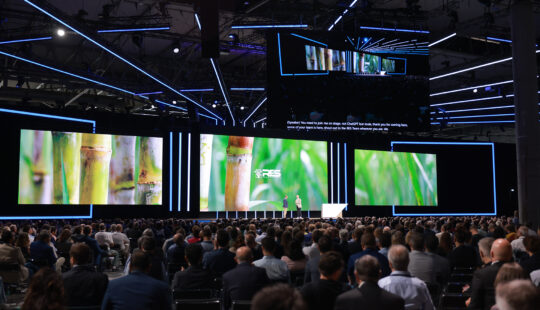SAP is delivering innovations today that will redefine enterprise software and future-proof its customers’ business, Executive Board Members Thomas Saueressig, head of SAP Product Engineering, and CTO Juergen Mueller said during their SAP Sapphire keynote this week.
“Fifty years ago SAP built the first ERP system, 30 years ago we made real time a reality, and 10 years ago we entered the cloud,” Saueressig said. “Today, we are actually innovating together with all of you to redefine enterprise software and future-proof your business entering the era of AI. We’ve been alongside you, your businesses, and your industries with continuous improvement and continuous innovation.”
To kick off the keynote and to showcase a series of demos, Saueressig and Mueller invited two SAP colleagues, Lucy Alexander and Sangeetha Jayakumar, onto the SAP Sapphire stage in Orlando, Florida. Before diving into the demos and a customer panel that included Topcon, the Women’s Tennis Association, Henkel, and Nestlé, Saueressig and Mueller asked the two talents why they chose to work at SAP.
Alexander said she joined SAP because the software industry is the place to have an impact. “Just think: SAP has helped to produce more smartphones than any smartphone manufacturer, connecting all of us. We’ve also helped to make and distribute more vaccines than anyone else during the pandemic. To me, that’s impact.”
Jayakumar shared that she joined SAP because of the company’s commitment to sustainability. She admires SAP’s aspiration toward a future with zero emissions, zero waste, and zero inequality. “That’s why I chose SAP.”
SAP’s raft of sustainability solutions for customers was the first of the innovations highlighted by Saueressig and Mueller. SAP doubled down on its sustainability initiative in 2020 despite the pandemic, “because we were, and still are, truly committed to it,” Saueressig said.
The introduction earlier in the day of the green ledger for carbon accounting as part of the cloud ERP offerings RISE with SAP and GROW with SAP underscores the company’s continued commitment to enabling customers to truly measure their carbon footprints by moving from average carbon emissions to actuals. “We all know that to get to a low-carbon future, you need end-to-end transparency and visibility across the entire supply chain,” Saueressig said.
SAP Business Network help turn those fragmented supply chains into collaborative sustainable networks. The launch of SAP Business Network for Industries at SAP Sapphire is also a key part of the company’s strategy. “We are working on many industry-specific data networks, like Catena-X and Manufacturing-X,” said Saueressig. “But all of these networks are only possible if processes and data are seamlessly integrated.”
Picking up the theme, Mueller said that integration enables completely new possibilities such as synchronized planning, which is a closed loop between planning and execution. It is also automated and network aware.
“Our extended planning and analytics solutions span across financial planning, workforce planning, and demand planning,” Mueller explained. This allows SAP customers to see the impact of their decisions across all their lines of business, as well as planning more holistically.
To help companies extract and harmonize data from their SAP and non-SAP systems, SAP recently introduced SAP Datasphere.
“With SAP Datasphere, you can create a data model consuming data from different sources like SAP S/4HANA Cloud and SAP BW/4HANA, and non-SAP data sources like Google, BigQuery, and others,” Sangeetha explained during her demo. She added that SAP Datasphere has a great graphical modeling feature, helping to quickly create a data model with simple drag-and-drop functionality, which can then be visualized in a dashboard in SAP Analytics Cloud.
Saueressig cited SAP Datasphere as an example of how SAP is opening up more than ever, which is why SAP has seen the partnerships announced in this area, including Databricks, DataRobot, Collibra, and Confluent, and now Google Cloud. “We truly believe in the democratization of data,” he said.
Mueller noted that SAP has also recently announced AI partnerships with Aleph Alpha, IBM, and Microsoft. “But our key differentiator for you is how we use those technologies and embed these AI capabilities to reimagine business processes across all SAP solutions,” he said.
“There’s no doubt SAP is an AI company and SAP AI is built into our systems that power your business,” Saueressig added. As of today, SAP has delivered more than 130 embedded use cases of AI .
For example, SAP systems processed 40 million invoices automatically last year and generated savings of more than $366 million for customers. Now, generative AI is coming on top and will have widespread implications for a myriad of functions such as job descriptions, interview questions, product descriptions, and queries for analytics. SAP is already working on more than 80 use cases for generative AI.
SAP is differentiating in the AI sphere, because its models are trained on years of business data, and also responsible and trustworthy, Saueressig said.
After demonstrating with Alexander and Jayakumar how AI and natural language processing might be integrated into SAP Analytics, Saueressig predicted that AI “will be infused everywhere and enable totally new capabilities in our products.”
Mueller then demonstrated the use of generative AI for development. Currently, he noted, many SAP customers use standardized APIs to build future-proof extensions. “But imagine this,” he told the audience. “What if instead of coding myself, I could simply describe what I want, and SAP will take care of it? Wouldn’t that be cool? And we are actually making this a reality with generative AI.”
But the power of AI actually goes far beyond efficiency, according to Saueressig, who suggested we could also use AI to reshape the experience between humans and machines: “It’s a duet, not a duel.”
The keynote also revolved around how SAP has modernized its user interfaces and how it has used collaboration to streamline applications. It was shown how it is possible to improve and automate business processes using SAP Signavio solutions and how SAP Build and SAP Integration Suite can bridge the gap between business and IT.
“SAP enables enterprise automation because we know that you are under a lot of pressure when it comes to efficiency in your organizations and with that you can continuously identify and improve processes,” Mueller said.
During the customer panel, participants explained all the different ways they are using SAP to innovate and future-proof their businesses. Then Mueller and Saueressig summed up the key innovations that had been discussed.
“To summarize all these innovations, we enable risk resilient supply chains,” Saueressig said. “We connect your business to a broader network. We help you plan across the business. We infuse AI across the whole portfolio of SAP and we want to provide you with a new intuitive user experience and collaboration capabilities, all enabled by our leading SAP Business Technology Platform.”



